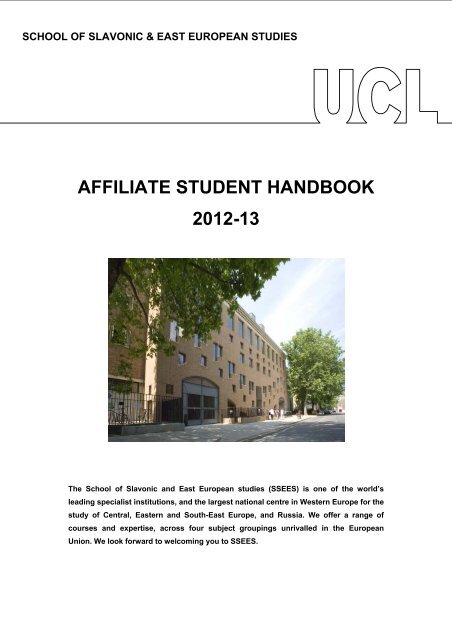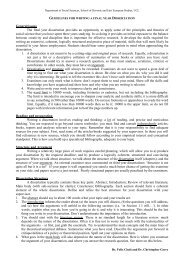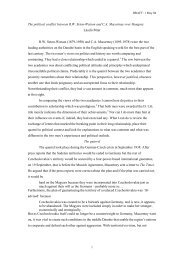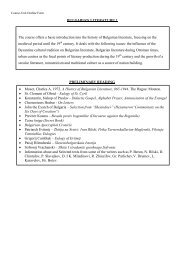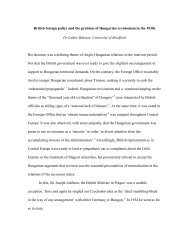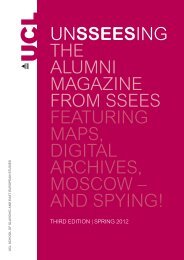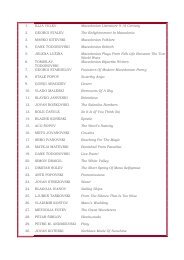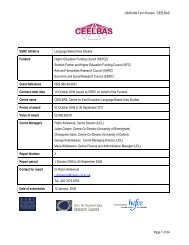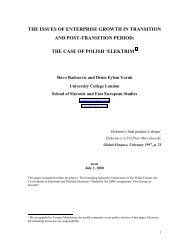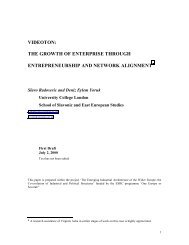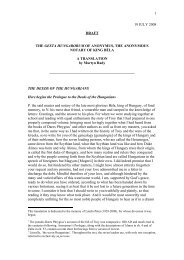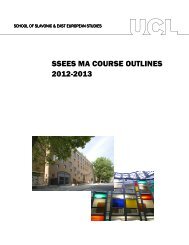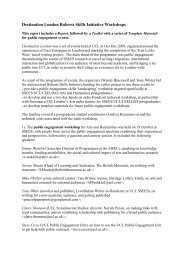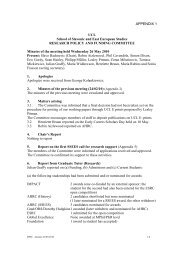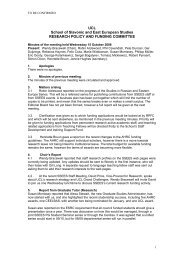affiliate student handbook 2012-13 - the UCL School of Slavonic ...
affiliate student handbook 2012-13 - the UCL School of Slavonic ...
affiliate student handbook 2012-13 - the UCL School of Slavonic ...
Create successful ePaper yourself
Turn your PDF publications into a flip-book with our unique Google optimized e-Paper software.
SCHOOL OF SLAVONIC & EAST EUROPEAN STUDIES<br />
`<br />
AFFILIATE STUDENT HANDBOOK<br />
<strong>2012</strong>-<strong>13</strong><br />
The <strong>School</strong> <strong>of</strong> <strong>Slavonic</strong> and East European studies (SSEES) is one <strong>of</strong> <strong>the</strong> world’s<br />
leading specialist institutions, and <strong>the</strong> largest national centre in Western Europe for <strong>the</strong><br />
study <strong>of</strong> Central, Eastern and South-East Europe, and Russia. We <strong>of</strong>fer a range <strong>of</strong><br />
courses and expertise, across four subject groupings unrivalled in <strong>the</strong> European<br />
Union. We look forward to welcoming you to SSEES.
Contents<br />
1. Introduction and Welcome from <strong>the</strong> Affiliate Tutor<br />
2. Support, Advice and Lines <strong>of</strong> Communication<br />
2.1 Affiliate Contacts<br />
2.2 Student Administration Office<br />
2.3 Programme Administrators<br />
2.4 O<strong>the</strong>r Useful Contacts<br />
3. Information on College Terms<br />
3.1 Term Dates<br />
3.2 College Closures<br />
4. Affiliate Study Guide<br />
4.1 Study Methods<br />
4.2 Some helpful terminology: an A – Z<br />
4.3 Reading<br />
4.4 Moodle<br />
4.5 Coursework<br />
4.5.1 Penalties for late submission <strong>of</strong> coursework<br />
4.5.2 Penalties for over-length coursework<br />
4.5.3 Extensions<br />
4.5.4 Note on study skills and plagiarism<br />
4.5.5 Attendance<br />
5. Assessment Details<br />
5.1 Assessment <strong>of</strong> non-language courses<br />
5.2 Assessment <strong>of</strong> language courses<br />
5.3 Examinations<br />
5.4 ECTS and US Grades<br />
5.5. Transcripts<br />
5.6 Past examination papers
6. Choosing your courses<br />
6.1 Online timetable<br />
6.2 Courses outside <strong>of</strong> SSEES<br />
6.3 Changing courses<br />
7. Communication with <strong>UCL</strong>-SSEES<br />
7.1 Email<br />
7.2 Office Hours<br />
7.3 Student Feedback<br />
8. Experiencing Difficulties?<br />
8.1 Health and Welfare Facilities<br />
8.1.1 The <strong>UCL</strong> Health Centre<br />
8.1.2 Student Psychological Services<br />
8.2 <strong>UCL</strong> Union Nightline<br />
8.3 Disability Centre<br />
8.4 Dyslexia Assessment and Support Centre<br />
8.5 Student Grievances<br />
9. <strong>UCL</strong>-SSEES Activities<br />
9.1 Student Common Room<br />
9.2 Libraries<br />
9.3 SSEES Computing and Photocopying Facilities<br />
9.4 Clubs and Societies at <strong>UCL</strong><br />
9.5 <strong>UCL</strong> Students Union<br />
9.6 University <strong>of</strong> London Union (ULU)<br />
9.7 Student Residence Services<br />
9.8 Seminars, Conferences and Workshops<br />
10. What have previous Affiliates Said?<br />
11. SSEES Course Options 2011-12<br />
11.1 Language and Culture<br />
11.2 History<br />
11.3 Economics and Business<br />
11.4 Politics and Sociology
1. Introduction and Welcome<br />
“Welcome to <strong>the</strong> <strong>School</strong> <strong>of</strong> <strong>Slavonic</strong> and East European Studies, University College London (SSEES-<br />
<strong>UCL</strong>).<br />
This <strong>handbook</strong> answers many commonly asked questions about what to expect as an <strong>affiliate</strong> <strong>student</strong><br />
in <strong>the</strong> department <strong>of</strong> SSEES. You should keep this <strong>handbook</strong> throughout your time at <strong>UCL</strong> as a<br />
reference guide.<br />
The <strong>School</strong> <strong>of</strong> <strong>Slavonic</strong> and East European Studies was established on 19 October 1915 by Tomáš<br />
Garrigue Masaryk. Our mission ever since has been informed by research questions rooted in <strong>the</strong><br />
language, history, culture, economy and society <strong>of</strong> our region. This philosophy lies at <strong>the</strong> heart <strong>of</strong> all our<br />
activities, including our teaching. The <strong>School</strong> has become one <strong>of</strong> <strong>the</strong> world’s leading specialist<br />
institutions and is truly international in flavour, attracting applications from across <strong>the</strong> world. In 1999 we<br />
merged with <strong>UCL</strong> – London’s Global University, thus becoming part <strong>of</strong> one <strong>of</strong> <strong>the</strong> world’s leading<br />
universities and in October 2005 <strong>the</strong> new SSEES building was <strong>of</strong>ficially opened on <strong>the</strong> occasion <strong>of</strong> <strong>the</strong><br />
<strong>School</strong>'s 90th anniversary.<br />
SSEES consists <strong>of</strong> four undergraduate programmes: Language and Culture, History, Politics and<br />
Economics and Business. Towards <strong>the</strong> back <strong>of</strong> this <strong>handbook</strong> you will find a summary <strong>of</strong> <strong>the</strong><br />
undergraduate modules <strong>of</strong>fered within <strong>the</strong>se programmes. Undergraduate study is <strong>of</strong> course only a<br />
small part <strong>of</strong> <strong>the</strong> activity occurring at SSEES. SSEES is engaged in high quality and innovative<br />
research; we sustain 5 distinct research centres, each with <strong>the</strong>ir own research projects and seminar<br />
series, and 4 research groups; we have an active body <strong>of</strong> research <strong>student</strong>s covering disciplines across<br />
<strong>the</strong> school; we are engaged in partnerships at various levels with institutions and organisations across<br />
Central and Eastern Europe and Russia and in SSEES library host a unique and extensive collection <strong>of</strong><br />
regionally relevant resources.<br />
At SSEES, we pride ourselves on being a friendly and welcoming <strong>School</strong>, with a deep and long lasting<br />
commitment to <strong>the</strong> <strong>UCL</strong> vision <strong>of</strong> ‘making a difference’ both to <strong>the</strong> <strong>student</strong>s we work with and to <strong>the</strong><br />
wider world. We look forward to welcoming you to SSEES and are confident that your time here will be<br />
rewarding. Please feel free to contact us in advance should you need any fur<strong>the</strong>r information.”<br />
Dr Eric Gordy<br />
SSEES Affiliate Tutor
2. Support, Advice and Lines <strong>of</strong> Communication<br />
2.1 Affiliate Contacts<br />
SSEES Affiliate Tutor<br />
<strong>UCL</strong> International Office<br />
Dr Eric Gordy<br />
SSEES, Room 323<br />
16 Taviton Street<br />
<strong>UCL</strong><br />
London<br />
WC1H 0BW<br />
Tel: +44 20 7679 8728<br />
Fax: +44 20 7679 8777<br />
Email: e.gordy@ucl.ac.uk<br />
2.2 Student Administration Office<br />
The Student Administration Office, Room 341, is located on <strong>the</strong> third floor <strong>of</strong> <strong>the</strong> SSEES building. Here<br />
you can contact <strong>the</strong> Programmes Administrators if (for example) you need course information or want to<br />
collect a marked piece <strong>of</strong> coursework. The <strong>of</strong>fice is open at <strong>the</strong> following times:<br />
Monday<br />
Tuesday<br />
Thursday<br />
Friday<br />
Wednesday<br />
<strong>UCL</strong> International Office<br />
10am to 4pm<br />
10am to 1pm<br />
2.2.1 Programmes Administrators<br />
Lina Kamenova<br />
International Student Welfare Advisor<br />
Email: l.kamenova@ucl.ac.uk<br />
Tel: +020 7679 2051.<br />
Economics & Business Mr Mat<strong>the</strong>w Brown<br />
SSEES Affiliate Administrator<br />
Miss Farha Ahmad<br />
SSEES, Room 341<br />
16 Taviton Street<br />
<strong>UCL</strong><br />
London<br />
WC1H 0BW<br />
Tel: +44 20 7679 8770<br />
Fax: +44 20 7679 8777<br />
Email: farhat.ahmad@ucl.ac.uk<br />
Rm 341<br />
Tel: 020 7679 8772<br />
Email: m.brown@ssees.ucl.ac.uk
History Ms Susie Rizvi Rm 341 020 7679 8774<br />
Email: s.rizvi@ssees.ucl.ac.uk<br />
Languages & Culture Mr Ben Chatterley Rm 341 020 7679 8771<br />
Email:<br />
b.chatterley@ssees.ucl.ac.uk<br />
Politics Ms Sasha Aleksic Rm 341 020 7679 8773<br />
Email: s.aleksic@ssees.ucl.ac.uk<br />
Academic Administration<br />
Manager<br />
2.3 O<strong>the</strong>r Useful Contacts<br />
Faculty Tutor<br />
Dean <strong>of</strong> Students<br />
Mr Joe Dally-Fitzsimons Rm. 341 020 7679 8820<br />
Email: j.dallyfitzsimons@ssees.ucl.ac.uk<br />
Andrew Huxley<br />
Building<br />
Dr Ruth Siddall G6 Ground Floor<br />
4 Taviton Street<br />
<strong>UCL</strong> Counselling Service Jacynta Etienne 3 Taviton Street, 1st<br />
Floor,<br />
Rm 101<br />
Rights & Advice Centre Hameera Saeed 15 Gordon Street, 1st<br />
Floor, Bloomsbury<br />
Theatre Building<br />
020 7679 7732<br />
020 7679 4545<br />
Dean.<strong>of</strong>.Students@ucl.<br />
ac.uk<br />
020 7679 1487<br />
j.etienne@ucl.ac.uk<br />
020 7679 2998<br />
h.saeed@ucl.ac.uk<br />
Advisors to Women <strong>student</strong>s Dr Hilary Richards 020 7679 0882<br />
020 7679 0884<br />
h.richards@ucl.ac.uk<br />
<strong>UCL</strong> Students Union 25 Gordon Street 020 7387 3611<br />
<strong>UCL</strong> Health Centre 3 Gower Place 020 7387 6306<br />
Accommodation Offices University <strong>of</strong> London:<br />
Basement,<br />
Senate House, South<br />
Block<br />
<strong>UCL</strong>: 117 Gower St<br />
Careers Service<br />
Patrice Ware (for<br />
SSEES)<br />
Wednesdays in Room<br />
503, 16 Taviton Street<br />
Disability Co-ordinator Marian Hingston Lamb Room G16, Registrar’s<br />
Registrar’s Division<br />
Division<br />
Nightline (6pm-8am) An all-night service for<br />
<strong>student</strong>s wanting help<br />
3. Information on College Terms<br />
020 7862 8880<br />
ulao@accom.lon.ac.uk<br />
020 7679 7077<br />
residences@ucl.ac.uk<br />
020 7866 3600<br />
p.ware@ucl.ac.uk<br />
020 7679 <strong>13</strong>43<br />
disability@ucl.ac.uk<br />
020 7436 5561
<strong>UCL</strong> operates over three terms – an autumn term, a spring term and a summer term. Main teaching<br />
takes place in <strong>the</strong> autumn and spring terms and <strong>the</strong> summer term is used primarily for revision and<br />
exams. Affiliate <strong>student</strong>s can join SSEES for one <strong>of</strong> <strong>the</strong> following study periods:<br />
a) For a full academic year <strong>of</strong> 9 months, September–June.<br />
b) For <strong>the</strong> autumn term <strong>of</strong> 3 months, September–December.<br />
c) For <strong>the</strong> spring and summer terms totalling 6 months, January–June.<br />
Please note that not all courses operate in both teaching terms but that it is usually possible to take half<br />
<strong>of</strong> a full year course.<br />
3.1 Term dates<br />
Academic Year <strong>2012</strong>-20<strong>13</strong><br />
Term Date<br />
First Term Monday 24 September <strong>2012</strong> - Friday 14 December <strong>2012</strong><br />
Second Term Monday 7 January 20<strong>13</strong> - Friday 22 March 20<strong>13</strong><br />
Third Term Monday 22 April 20<strong>13</strong> - Friday 7 June 20<strong>13</strong><br />
3.2 College Closures<br />
College Reading Weeks: weeks beginning Monday 5 November <strong>2012</strong> and Monday 11 February 20<strong>13</strong>.<br />
Christmas: College closes on Saturday 22 December <strong>2012</strong> and re-opens on Tuesday 1 January 20<strong>13</strong>.<br />
Easter: College closes on Thursday 28 March 20<strong>13</strong> and re-opens on Tuesday 2 April 20<strong>13</strong>.<br />
Bank Holidays:<br />
• Monday 6 May 20<strong>13</strong><br />
• Monday 27 May 20<strong>13</strong><br />
4. Affiliate Study Guide<br />
Most <strong>affiliate</strong> <strong>student</strong>s find that <strong>the</strong>ir experience <strong>of</strong> studying at <strong>UCL</strong> is quite different from what <strong>the</strong>y<br />
have been used to at <strong>the</strong>ir home university. For some, this can be a source <strong>of</strong> frustration. However, this<br />
should not be <strong>the</strong> case; ra<strong>the</strong>r <strong>the</strong> different styles <strong>of</strong> teaching and learning on <strong>of</strong>fer should be one <strong>of</strong> <strong>the</strong><br />
fundamental reasons why you wish to study abroad. Your experience <strong>of</strong> <strong>the</strong> academic approach<br />
employed in ano<strong>the</strong>r country forms a significant part <strong>of</strong> your experience <strong>of</strong> that country’s culture. We<br />
hope that reading what follows might help prepare you for some <strong>of</strong> this:
4.1 Study Methods<br />
One <strong>of</strong> <strong>the</strong> main differences with studying in <strong>the</strong> UK is that, while you will receive a course outline and<br />
reading lists, <strong>the</strong>re is a much greater expectation that <strong>student</strong>s will read around <strong>the</strong>ir subjects<br />
independently, and be ready to apply <strong>the</strong>ir research through participation in tutorial classes. In addition,<br />
<strong>the</strong> emphasis in class discussions, class presentations and essay writing is NOT on regurgitating<br />
information given to you in <strong>the</strong> course, but instead, on using that information and that acquired from<br />
your independent reading, to demonstrate understanding in particular contexts.<br />
Students who demonstrate <strong>the</strong> capacity, in <strong>the</strong>ir assessments, to apply learning critically and logically to<br />
particular issues tend to do better than those simply reproducing facts or quotes or figures learned by<br />
heart.<br />
Note: unless <strong>the</strong> course you are sitting is intended to teach you a foreign language (e.g. Russian,<br />
Romanian etc) <strong>the</strong>n all courses are taught and assessed in English.<br />
4.2 Learning Agreements<br />
Your learning agreement should be signed by <strong>the</strong> Affiliate Tutor (Departmental Coordinator) and <strong>the</strong><br />
International Office (Institutional Coordinator). The Affiliate Administrator will be able to stamp <strong>the</strong> form<br />
for you. Please complete this exercise during term time. If you need pro<strong>of</strong> <strong>of</strong> <strong>student</strong> status you should<br />
contact <strong>UCL</strong> Student Records on <strong>the</strong> below contact details:<br />
Room G9, Ground Floor, South Wing, Main Campus<br />
<strong>UCL</strong> Registry<br />
University College London<br />
Gower Street<br />
London<br />
WC1E 6BT<br />
Tel: 020 7679 7005 or: 020 7679 7920<br />
Email: <strong>student</strong>records@ucl.ac.uk<br />
Opening hours: Monday - Friday 10.00am - 4.00pm<br />
(except during October, Monday - Friday 10:00am - 3:00pm)<br />
4.3 Some helpful terminology: an A - Z<br />
Affiliate Tutor: Each <strong>UCL</strong> department has an Affiliate Tutor responsible for incoming <strong>student</strong>s visiting<br />
from abroad. At SSEES <strong>the</strong> Affiliate Tutor is currently Dr Eric Gordy. This is <strong>the</strong> person responsible for<br />
advising you in your module choices and for making final decisions as appropriate. The Affiliate Tutor<br />
will have weekly <strong>of</strong>fice hours and will be available to advise you on all academic and personal matters.<br />
The Affiliate Tutor will act as your personal tutor during your time at <strong>UCL</strong>. If you are having medical,<br />
personal or o<strong>the</strong>r problems, which you feel may affect your performance you should discuss <strong>the</strong>se with<br />
<strong>the</strong> Affiliate Tutor as soon as you feel able. At SSEES we treat <strong>the</strong> task <strong>of</strong> pastoral care particularly<br />
seriously.<br />
Classes, Tutorial Classes and Seminars: These are typically small group sessions and might be<br />
referenced with any or all <strong>of</strong> <strong>the</strong> above names. Typically, <strong>the</strong> role <strong>of</strong> <strong>the</strong> <strong>student</strong> in <strong>the</strong>se sessions is<br />
much more proactive, requiring anything from presentations and discussions to group work and roleplay.<br />
NOTE: <strong>the</strong> term ‘classes’ in <strong>the</strong> UK always refers to this small-scale interactive learning style and not to<br />
‘lectures’, as for example in <strong>the</strong> U.S.
Class teacher: The class teacher may differ from <strong>the</strong> lecturer and may be a postgraduate research<br />
<strong>student</strong> with expertise in a particular area.<br />
College: When you hear people refer to <strong>the</strong> ‘college’ <strong>the</strong>y are normally referring to <strong>UCL</strong> as a whole.<br />
Course: This is <strong>the</strong> term we use to describe a particular option or module regardless <strong>of</strong> its length or<br />
value in course-units (see below) e.g. I refer to my option in ‘European Economic Policy’ as a ‘course’<br />
and it is worth 0.5 course-units.<br />
Course-units: Course-units are <strong>the</strong> unit by which <strong>UCL</strong> measures its credits. An academic year at <strong>UCL</strong><br />
typically consists <strong>of</strong> 4 course-units (cu) for each <strong>student</strong>. A course running for one term usually has a<br />
value <strong>of</strong> 0.5 cu (though some departments have year long courses worth 0.5 cu) and one running<br />
throughout <strong>the</strong> year has a value <strong>of</strong> 1.0 cu. If you are here for a full academic year you should take 4 cu<br />
and consider it as equivalent to 32 U.S. credits or <strong>the</strong> annual required ECTS <strong>of</strong> your institution if you are<br />
an Erasmus <strong>student</strong> (normally 60 ECTS).<br />
Lectures: Lectures refer to that part <strong>of</strong> <strong>the</strong> course which all <strong>student</strong>s attend where it is typical for <strong>the</strong><br />
lecturer to play <strong>the</strong> predominant role in that session. Not all courses at SSEES are lecture based.<br />
Lecturer: The lecturer is normally a full-time member <strong>of</strong> <strong>the</strong> academic staff involved in teaching and<br />
research and will have been involved in designing and monitoring <strong>the</strong> course.<br />
Office Hours: These are <strong>the</strong> hours during which academics make <strong>the</strong>mselves available to you should<br />
you wish to discuss your work with <strong>the</strong>m. Office hours, held in <strong>the</strong> academics <strong>of</strong>fice are detailed on <strong>the</strong><br />
SSEES website: http://www.ssees.ucl.ac.uk/OfficeHours.pdf<br />
Portico (www.ucl.ac.uk/portico): This is <strong>the</strong> name <strong>of</strong> <strong>the</strong> <strong>UCL</strong> Student Information Service which<br />
contains your personal and contact details. It also contains your module selections and important exam<br />
information, so should be checked on a regular basis.<br />
Reading week: This is a week during <strong>the</strong> autumn and spring term in which no teaching is scheduled in<br />
SSEES and some o<strong>the</strong>r departments in <strong>the</strong> college. Students are expected to use this week to read<br />
around and research <strong>the</strong>ir current subjects in order to broaden <strong>the</strong>ir knowledge <strong>of</strong> <strong>the</strong> material covered<br />
in each course.<br />
Term: The <strong>UCL</strong> academic year is divided into 3 terms: an autumn term (12 weeks), a spring term (11<br />
weeks) and a summer examination term (7 weeks). The equivalent terminology for <strong>the</strong>se, in your home<br />
university, might be ‘semester’.<br />
Moodle (www.ucl.ac.uk/moodle): This is a web-based teaching resource used for some <strong>UCL</strong> courses. If<br />
this applies to your module <strong>the</strong>n you will receive instructions from <strong>the</strong> course tutor on how to access <strong>the</strong><br />
web facility. You may be required to submit your assessed coursework to Moodle and again <strong>the</strong> course<br />
tutor will give you instructions.<br />
4.4 Reading<br />
You will normally be issued with a reading list at <strong>the</strong> start <strong>of</strong> each course and in some cases you will be<br />
given weekly reading tasks. Where you are not given specific weekly reading <strong>the</strong> expectation is that you<br />
will be pursuing your own reading around <strong>the</strong> topic. This approach helps you to become more<br />
independent in your academic thinking and research.<br />
4.5 Moodle<br />
SSEES is making increased use <strong>of</strong> Moodle to facilitate communication among <strong>student</strong>s and staff.<br />
Moodle pages can feature a variety <strong>of</strong> materials, such as core course materials for download, a blog,<br />
discussion boards, a wiki, training in <strong>the</strong> use <strong>of</strong> Moodle and o<strong>the</strong>r resources. To access Moodle, please<br />
visit https://moodle.ucl.ac.uk/login/index.php. You will need to enter your <strong>UCL</strong> username and<br />
password, and <strong>the</strong>n select ‘<strong>UCL</strong> <strong>School</strong> <strong>of</strong> <strong>Slavonic</strong> and East European Studies’.
4.6 Coursework<br />
All courses have elements <strong>of</strong> coursework in <strong>the</strong> form <strong>of</strong> written assignments and essays, short<br />
exercises and literary reviews. This coursework may be non-assessed or assessed. If it is nonassessed<br />
coursework <strong>the</strong>n it will not form part <strong>of</strong> your final course mark, whereas assessed coursework<br />
will. In both cases though, <strong>the</strong> coursework will be marked and you will receive feedback. Whe<strong>the</strong>r<br />
assessed or not submission <strong>of</strong> <strong>the</strong> coursework is compulsory and failure to complete coursework may<br />
result in you not receiving a mark for that course.<br />
4.6.1 Penalties for late submission <strong>of</strong> coursework<br />
o The full allocated mark will be reduced by 5 percentage points for <strong>the</strong> first working day after <strong>the</strong><br />
deadline for <strong>the</strong> submission <strong>of</strong> coursework.<br />
o The mark will be reduced by a fur<strong>the</strong>r 10 percentage points if coursework is submitted during <strong>the</strong><br />
following six days.<br />
o Coursework that is submitted later than seven days after <strong>the</strong> deadline, providing it is submitted<br />
during <strong>the</strong> following six days.<br />
o Where <strong>the</strong>re are extenuating circumstances that have been recognised by <strong>the</strong> Affiliate Tutor, <strong>the</strong>se<br />
penalties will not apply until <strong>the</strong> agreed extension period has been exceeded.<br />
4.6.2 Penalties for over-length coursework<br />
o Ideally <strong>student</strong>s should adhere to <strong>the</strong> prescribed word counts published in <strong>the</strong> course description. In<br />
terms <strong>of</strong> penalties, however, assessed work that is more than 10% longer than <strong>the</strong> prescribed word<br />
count should not be accepted for submission (i.e. it will not be date-stamped or o<strong>the</strong>rwise recorded<br />
as formally submitted), but immediately returned to <strong>the</strong> <strong>student</strong> with instructions to reduce <strong>the</strong> word<br />
length. The work may <strong>the</strong>n be resubmitted, noting that penalties for late submission will apply.<br />
o For work which exceeds <strong>the</strong> upper word limit by 20% or more, a mark <strong>of</strong> zero will be recorded<br />
although <strong>the</strong> assessment will be considered to be complete.<br />
o If submitted work is subsequently found to have an inaccurately stated word count and to exceed<br />
<strong>the</strong> upper word limit by at least 10% and by less than 20%, <strong>the</strong> mark will be reduced by ten<br />
percentage points. However <strong>the</strong> mark cannot be reduced below <strong>the</strong> minimum pass mark, assuming<br />
that <strong>the</strong> work merited a pass. (I.e. <strong>the</strong> penalty will not be used to fail a <strong>student</strong> because <strong>the</strong>y have<br />
exceeded <strong>the</strong> stated word count by more than 10% but less than 20%.)<br />
o For discipline specific practices such as tables, pictures and graphs, whe<strong>the</strong>r <strong>the</strong>se are recorded as<br />
part <strong>of</strong> <strong>the</strong> upper word limit or how <strong>the</strong>y will be counted will be stated in <strong>the</strong> course description.<br />
4.6.3 Extensions<br />
In <strong>the</strong> case <strong>of</strong> formally assessed coursework, requests for extensions to deadlines will only be<br />
considered in cases <strong>of</strong> ongoing serious medical or personal problems, if supported by medical or o<strong>the</strong>r<br />
written evidence. Such requests should be submitted, preferably well before <strong>the</strong> deadline, to <strong>the</strong> Affiliate<br />
Tutor.<br />
4.6.4 Note on study skills and plagiarism<br />
A complete guide to study skills and plagiarism can be found here:<br />
http://www.ssees.ucl.ac.uk/current<strong>student</strong>s.htm. However, we do draw your attention to <strong>the</strong> issue <strong>of</strong><br />
Plagiarism:<br />
Plagiarism is defined as <strong>the</strong> presentation <strong>of</strong> ano<strong>the</strong>r person’s thoughts or words or artefacts or s<strong>of</strong>tware<br />
(including from <strong>the</strong> internet) as though <strong>the</strong>y were your own. Any quotation from <strong>the</strong> published or<br />
unpublished works <strong>of</strong> o<strong>the</strong>r persons, must <strong>the</strong>refore, be clearly identified as such by being placed inside<br />
quotation marks, and you should identify your source as accurately and fully as possible.
The College treats <strong>the</strong> issue <strong>of</strong> plagiarism very seriously. Any detected cases are reported to <strong>the</strong><br />
college authorities and can result in exclusion from examinations.<br />
4.7 Attendance<br />
<strong>UCL</strong> has a duty to monitor <strong>the</strong> attendance, conduct and progress <strong>of</strong> all <strong>student</strong>s. This is no different for<br />
<strong>affiliate</strong> <strong>student</strong>s. Attendance at lectures and classes is compulsory and is monitored by <strong>the</strong> Course<br />
Tutor. Each term, your Course Tutor will be asked to comment on your work and attendance and to<br />
notify <strong>the</strong> Affiliate Tutor when this is not satisfactory.<br />
<strong>UCL</strong> regulations state that <strong>student</strong>s may only be entered for examinations or assessments if <strong>the</strong>ir<br />
teachers are able to confirm at least 70% attendance and that <strong>the</strong>ir performance on <strong>the</strong> course has<br />
been satisfactory.<br />
That is, to receive a grade for your course you must a) attend satisfactorily and b) submit coursework as<br />
requested. You will be asked to explain and justify any absences from <strong>the</strong> college and a medical<br />
certificate may be asked for if absences persist for more than one week. If your attendance or<br />
performance is deemed unsatisfactory you will not be awarded credit.<br />
5. Assessment Details<br />
In general, at <strong>UCL</strong> SSEES, <strong>the</strong>re are 3 types <strong>of</strong> work that you need to be aware <strong>of</strong>:<br />
1. Examinations: <strong>the</strong>se take place principally in <strong>the</strong> summer term though <strong>the</strong>re are some oral<br />
examinations at o<strong>the</strong>r times. September-December <strong>affiliate</strong>s do not take exams.<br />
2. Assessed coursework: <strong>the</strong>se are set in both autumn and spring terms on some but not all<br />
courses.<br />
3. Non-assessed coursework: Often courses are 100% exam based and <strong>the</strong> coursework through<br />
<strong>the</strong> year is non-assessed. It is still compulsory but will not count toward your final mark.<br />
PLEASE MAKE SURE THAT YOU ARE AWARE OF HOW YOU ARE TO BE EXAMINED FOR EACH<br />
MODULE YOU ARE REGISTERED FOR.<br />
5.1 Assessment <strong>of</strong> non-language courses<br />
a) Full-year <strong>student</strong>s: examined as per SSEES <strong>student</strong>s.<br />
b) Term 2 <strong>student</strong>s on term 2 courses: examined as per SSEES <strong>student</strong>s.<br />
c) Students on term 1 half-unit (0.5) courses: 2 pieces <strong>of</strong> work totalling to 5,000 words<br />
d) Students doing half <strong>of</strong> a 1.0 course-unit course: 2 pieces <strong>of</strong> work totalling to 5,000 words<br />
e) Students doing half <strong>of</strong> a half-unit course (0.25): 1 piece <strong>of</strong> work totalling to 2,500 words<br />
5.2 Assessment <strong>of</strong> language courses<br />
a) Full year <strong>student</strong>s: assessed exactly as per SSEES <strong>student</strong>s.<br />
b) First term only <strong>student</strong>s: assessment to include an oral examination plus a portfolio <strong>of</strong> that<br />
term’s coursework. If no oral exam, <strong>the</strong> portfolio must include work additional to that done by<br />
SSEES <strong>student</strong>s during that term.
c) Second term only <strong>student</strong>s: can only join <strong>the</strong> course if at an equivalent level to continuing<br />
<strong>student</strong>s. Therefore <strong>the</strong> assessment is as per SSEES <strong>student</strong>s.<br />
Whenever <strong>the</strong>re is coursework – be it assessed or non-assessed – it is essential that you submit it if<br />
you wish to gain credits for <strong>the</strong> unit.<br />
Please make sure you follow <strong>the</strong> instructions on each course regarding how, where and when to submit<br />
your work and you are advised to keep a copy <strong>of</strong> it to be on <strong>the</strong> safe side! You will be held responsible<br />
should things go missing.<br />
5.3 Examinations<br />
The <strong>UCL</strong> examination period takes place during <strong>the</strong> third term <strong>of</strong> <strong>the</strong> year (May-June). Students<br />
scheduled to take examinations must be in attendance at <strong>the</strong> college during this period. For <strong>affiliate</strong>s<br />
here during <strong>the</strong> first term only alternative assessment arrangements apply, as explained elsewhere in<br />
this guide.<br />
Your Portico record will detail your exam entry for each course. It is important that <strong>the</strong> information on<br />
Portico is correct o<strong>the</strong>rwise you may be entered for <strong>the</strong> wrong exam. Examination timetables are<br />
published in March and will appear on your Portico record. Your timetable will list exam locations, times,<br />
and regulations. Please check this very carefully and report any problems to <strong>the</strong> Affiliate Administrator<br />
immediately<br />
Students with disabilities, medical conditions or dyslexia, should consult <strong>the</strong> International Office in <strong>the</strong><br />
first instance. They may refer you to <strong>the</strong> university disability co-ordinator.<br />
In examinations permitting <strong>the</strong> use <strong>of</strong> calculators you should familiarise yourself with <strong>the</strong> type <strong>of</strong><br />
calculators permitted. Two approved versions are available from <strong>the</strong> <strong>UCL</strong> shop: CASIO<br />
FX83WA/FX83MS (battery) or CASIO FX85WA/FX85MS (solar)<br />
If you are absent from an examination you must inform both <strong>the</strong> International Office and SSEES as<br />
soon as possible. If you are absent due to illness or accident, you must submit medical documentation<br />
immediately after <strong>the</strong> examination(s) in question.<br />
If you feel your revision for exams is being disrupted through illness you must speak to <strong>the</strong> Affiliate<br />
Tutor at that time and not after or during <strong>the</strong> exam period.<br />
Examination marking: all <strong>UCL</strong> examinations are double marked and many are also externally marked.<br />
Exam scripts are anonymous and marked by candidate number.<br />
5. 4 ECTS and US Grades<br />
Examination marks will be converted to US grades according to a standard scheme detailed for you by<br />
<strong>the</strong> International Office. European <strong>student</strong>s will have <strong>the</strong>ir performance credited formally through an<br />
ECTS transcript.<br />
The pass mark for exams is 40% and <strong>the</strong> overwhelming majority <strong>of</strong> <strong>student</strong>s achieve marks between<br />
40% and 70%. Achieving grades <strong>of</strong> over 70% is an indication <strong>of</strong> excellence.<br />
<strong>UCL</strong> generally works to <strong>the</strong> following marking scheme:<br />
Degree Class % Mark European Grade US Grade<br />
First 70+ A A<br />
2:1 Upper Second 60-69 B A- (65-69)<br />
B+ (60-64)
2:2 Lower Second 50-59 C B (55-59)<br />
B- (50-54<br />
Third 40-49 D C+ (46-49)<br />
Fail 0-39 F F<br />
5.5 Transcripts<br />
C (43-45)<br />
C- (40-42)<br />
<strong>UCL</strong>’s Examinations Office will produce and dispatch transcripts for all visiting <strong>affiliate</strong> <strong>student</strong>s and any<br />
enquiries relating to examinations should be addressed directly to it.<br />
The Examinations Office will withhold transcripts <strong>of</strong> any <strong>student</strong>s with outstanding debt to <strong>the</strong> university,<br />
including overdue library books and fines, withheld residency fees and tuition fees.<br />
5.6 Past examination papers<br />
Past examination papers are held in <strong>the</strong> College Libraries and available on <strong>the</strong> SSEES website at:<br />
http://www.ssees.ucl.ac.uk/current<strong>student</strong>s.htm.<br />
6. Choosing your courses<br />
Hopefully you have already pre-selected courses from <strong>the</strong> <strong>UCL</strong> Study Abroad Guide prior to your arrival<br />
at SSEES. This will make <strong>the</strong> process <strong>of</strong> course selection and registering easier, although you will still<br />
need to apply formally for your courses using a course choice form and have <strong>the</strong>m approved by <strong>the</strong><br />
relevant Affiliate Tutor.<br />
As <strong>affiliate</strong> <strong>student</strong>s, you are obliged to take a full-time course load for <strong>the</strong> period you are here, that is:<br />
• Autumn (Fall) Term: 2 course-units (equivalent to 16 US credits / 30 ECTS)<br />
• Spring/Summer Term: 2 course-units<br />
• Full-year (3 terms): 4 course-units<br />
Each course/module is assigned a course-unit value that is ei<strong>the</strong>r one (1.0) or a half (0.5) unit.<br />
If you are registered solely with SSEES: You must take at least 50% <strong>of</strong> your courses within SSEES and<br />
you are obliged to complete all scheduled assessments as prescribed for individual courses.<br />
If you are registered jointly in two departments: You must take at least 50% <strong>of</strong> your course-units in your<br />
first admitting department and at least 25% in <strong>the</strong> o<strong>the</strong>r. Once again you are obliged to complete all<br />
scheduled assessments as prescribed for individual courses.<br />
6.1 Online Timetable<br />
The <strong>UCL</strong> Online Timetable lets you see your personal timetable week by week and can be used to find<br />
out when things are being taught across <strong>UCL</strong>. Use it to select course-units which will fit in your
timetable. Your personal timetable will display all <strong>the</strong> course-units you are registered to attend including<br />
lectures, seminars, tutorials, labs, film screenings, computer training and more. You must check it<br />
regularly for changes to dates, times or locations.<br />
Login with your standard <strong>UCL</strong> username and password to display your personal timetable, or select a<br />
department or subject area, a degree programme, or individual modules and create a custom timetable,<br />
to find out when things are scheduled to be taught.<br />
Your timetable is available to view at (http://www.ucl.ac.uk/timetable). You must check carefully to<br />
ensure that <strong>the</strong>re are no problems with timetable clashes. If <strong>the</strong>re are clashes please see <strong>the</strong> Affiliate<br />
Administrator immediately.<br />
TIP: Before submitting your course choice selection you must check <strong>the</strong> online timetable to make sure<br />
<strong>the</strong>re aren’t any clashes:<br />
Step 1: Click ‘Custom’ and ‘Click to Start’<br />
Step 2: Enter <strong>the</strong> module name and click ‘Search’<br />
Step 3: Click on <strong>the</strong> module you wish to select<br />
Step 4: Once you have made your entire selection click ‘Create Timetable’ to view <strong>the</strong> timetable.<br />
Step 5: You can change <strong>the</strong> display to show full year, term 1 and term 2.<br />
Step 6: Please note that you will normally only be required to attend <strong>the</strong> lecture and ONE <strong>of</strong> <strong>the</strong> tutorial<br />
groups. Please ask if you are unsure.<br />
Step 7: Once your courses are confirmed on Portico you will be able to login and view your personal<br />
timetable.<br />
NOTE: SSEES does not allow you to attend courses for which you are not registered for.<br />
6.2 Courses outside <strong>of</strong> SSEES:<br />
Should you wish to take courses outside <strong>of</strong> SSEES you will have to visit each individual department<br />
during registration week (e.g. Philosophy, Economics etc) in order to sign up for a course in that<br />
department. You will need to contact <strong>the</strong> relevant Affiliate Tutor from each department outside <strong>of</strong><br />
SSEES.<br />
In this case, it is your responsibility to check that your selection <strong>of</strong> outside courses does not involve<br />
timetable clashes with courses in SSEES.<br />
During <strong>the</strong> <strong>UCL</strong> International Students Orientation Programme you will be referred to <strong>the</strong> <strong>UCL</strong> Study<br />
Abroad Guide which lists all courses available throughout <strong>UCL</strong>.<br />
The guide is available on line at:<br />
http://www.ucl.ac.uk/prospective-<strong>student</strong>s/international-<strong>student</strong>s/study-abroad/overseas-<strong>student</strong>s-atucl/sag<br />
Please be aware that courses across <strong>the</strong> college rapidly fill up – so choosing your SSEES courses prior<br />
to arrival is a good idea.<br />
6.3 Changing courses<br />
Occasionally <strong>student</strong>s may wish to change <strong>the</strong>ir course options because <strong>the</strong>y find it does not meet <strong>the</strong>ir<br />
expectations. Changing courses after induction week will require a) availability on <strong>the</strong> new course<br />
selected b) <strong>the</strong> permission <strong>of</strong> <strong>the</strong> relevant Course Tutor and c) <strong>the</strong> permission <strong>of</strong> <strong>the</strong> Affiliate Tutor. In<br />
<strong>the</strong> case <strong>of</strong> <strong>the</strong> Affiliate Tutor’s permission, this will only be granted to those people observing <strong>the</strong><br />
guidelines and deadlines <strong>of</strong> registration week.
7. Communication with <strong>UCL</strong> SSEES<br />
7.1 Email<br />
Within SSEES we will make extensive use <strong>of</strong> email to contact you so it is essential that you are<br />
regularly checking your <strong>UCL</strong> email account. Please ensure that your details are up-to-date on Portico,<br />
including your mobile telephone number and term-time address. It is probable that a wealth <strong>of</strong> important<br />
information will be dispatched to you in this way, so check your email regularly.<br />
7.2 Office Hours<br />
All members <strong>of</strong> academic staff involved in teaching you hold weekly term time <strong>of</strong>fice hours during which<br />
<strong>the</strong>y are available to <strong>student</strong>s. For details <strong>of</strong> when <strong>the</strong>se are scheduled please see<br />
http://www.ssees.ucl.ac.uk/OfficeHours.pdf. If you wish to see a member <strong>of</strong> staff outside <strong>of</strong> term/<strong>of</strong>fice<br />
hours you should email <strong>the</strong>m to arrange an appointment.<br />
7.3 Student Feedback<br />
At <strong>the</strong> end <strong>of</strong> your time at SSEES you will be asked to complete an anonymous course-unit<br />
questionnaire for each course you studied. This is your opportunity to give feedback on areas <strong>of</strong> <strong>the</strong><br />
course you liked and to make suggestions on how <strong>the</strong> course might be improved. SSEES takes this<br />
process very seriously.<br />
8. Experiencing Difficulties?<br />
Very occasionally <strong>student</strong>s studying abroad may experience problems. In <strong>the</strong> main <strong>the</strong>se are easily<br />
solvable and occur during <strong>the</strong> ‘settling in’ period. However, for some problems it is useful to know that<br />
help is available if needed. Whatever your problem is– financial, personal or academic – talking to<br />
someone can help. The Affiliate Tutor is <strong>of</strong> course available to talk with you confidentially and anything<br />
you say to any <strong>of</strong> <strong>the</strong> SSEES staff <strong>of</strong> a personal nature will be treated with strict confidentiality.<br />
Support for <strong>student</strong>s during <strong>the</strong> pre-arrival phase and during <strong>the</strong>ir stay at <strong>UCL</strong> is provided by <strong>the</strong><br />
Student Centre (Registry & Academic Services). The link below gives fur<strong>the</strong>r information on Student<br />
Centre services http://www.ucl.ac.uk/current-<strong>student</strong>s/<strong>student</strong>_centre_folder/index.<br />
After a <strong>student</strong> has been <strong>of</strong>fered admission and prior to <strong>the</strong>ir arrival at <strong>UCL</strong>, <strong>student</strong> enquiries should be<br />
directed to new<strong>student</strong>s@ucl.ac.uk<br />
Once at <strong>UCL</strong>, <strong>student</strong>s with any issues are encouraged to visit <strong>the</strong> Student Centre in person. For more<br />
urgent enquiries <strong>the</strong> Manager <strong>of</strong> <strong>the</strong> Student Centre Tracey Smith may be contacted: Email:<br />
tracey.p.smith@ucl.ac.uk Tel: +020 7679 2036<br />
Students with welfare issues, both during <strong>the</strong> pre-arrival phase and during <strong>the</strong>ir stay at <strong>UCL</strong>, should<br />
contact <strong>UCL</strong>’s International Student Welfare Advisor Lina Kamenova Email: l.kamenova@ucl.ac.uk<br />
Tel: +020 7679 2051. Lina is also responsible for <strong>UCL</strong>’s International Students Orientation Programme.<br />
There are also o<strong>the</strong>r services available within <strong>the</strong> college.<br />
8.1 Health and Welfare Facilities<br />
All <strong>affiliate</strong> <strong>student</strong>s are entitled to access <strong>the</strong> free health and welfare services <strong>of</strong>fered by <strong>the</strong> college.
8.1.1 The <strong>UCL</strong> Health Centre<br />
Located at 3 Gower Place. The reception is located on <strong>the</strong> second floor. The practice is open from 9.00<br />
am to 5.30 pm Monday to Friday. A ‘drop-in’ service is available on weekdays from 9.30 am to 10.30<br />
am and 2.30 pm to 3.30 pm. For an appointment call 020 7387 6306.<br />
8.1.2 Student Psychological Services<br />
This is just down <strong>the</strong> road from us at 3 Taviton Street and can <strong>of</strong>fer individual counselling sessions<br />
lasting for 50 minutes. These sessions are for those <strong>student</strong>s, who having spoken to <strong>the</strong> Affiliate Tutor,<br />
still feel <strong>the</strong>y require some additional support.<br />
Talking to a counsellor can enable you to really identify your problems and <strong>the</strong>ir origins and may help<br />
you to develop effective means for dealing with <strong>the</strong>m. Counselling sessions are <strong>of</strong> course completely<br />
confidential and information will only be shared with third parties with your permission. To arrange an<br />
appointment contact Ms Jacyntha Etienne on 020-7679-1487 or visit number 3, room 101 on <strong>the</strong> first<br />
floor.<br />
Find more details on <strong>the</strong>ir website: http://www.ucl.ac.uk/<strong>student</strong>counselling/index_home<br />
General informal regarding <strong>student</strong> support can be found at: http://www.ucl.ac.uk/current<strong>student</strong>s/support<br />
8.2 <strong>UCL</strong> Union Nightline<br />
<strong>UCL</strong> <strong>student</strong>s <strong>the</strong>mselves provide a support service in <strong>the</strong> form <strong>of</strong> <strong>UCL</strong> Union Nightline which provides<br />
advice and/or just a person to talk to between 6pm and 8am. Nightline is located at ULU, Malet Street.<br />
You can call <strong>the</strong>m on 020-7631-0101 or email on listening@london-nightline.org.uk. Fur<strong>the</strong>r details can<br />
be found at http://www.nightline.org.uk/nl_calling.php.<br />
8.3 Disability Centre<br />
If you have any kind <strong>of</strong> disability <strong>the</strong>re may be support available. The <strong>UCL</strong> Disability Centre is open<br />
Monday-Friday, 10am – 4pm during term time and you can access advice on all available support <strong>the</strong>re.<br />
The centre is located in Room G16 South Wing, The Registry in <strong>the</strong> Main Building. You can call <strong>the</strong>m<br />
on 020-7679-0100, or email on disability@ucl.ac.uk and you can find out more on <strong>the</strong>ir website:<br />
http://www.ucl.ac.uk/disability/<br />
8.4 Dyslexia Assessment and Support Centre<br />
The <strong>UCL</strong> Dyslexia Assessment and Support Centre is located in <strong>the</strong> Department <strong>of</strong> Human<br />
Communication Science in Chandler House. If you are dyslexic or even concerned that you might be<br />
<strong>the</strong>n email on dyslexia@ucl.ac.uk. This is potentially very important since, if you are a <strong>student</strong> with<br />
dyslexia (or o<strong>the</strong>r disabilities) you might be eligible to receive vital examination support in <strong>the</strong> form <strong>of</strong><br />
special equipment, specific locations and/or additional time for <strong>the</strong> examinations. You can find out more<br />
by visiting <strong>the</strong> website: http://www.ucl.ac.uk/disability/services/dyslexia-centre.<br />
8.5 Student Grievances<br />
In exceptional circumstance <strong>student</strong>s, rightly or wrongly, perceive that <strong>the</strong>y have been unfairly treated.<br />
Examples include <strong>student</strong>s who feel <strong>the</strong>y have been harassed on sexual, racial or religious grounds; or<br />
<strong>student</strong>s that feel <strong>the</strong>ir assessment was not handled correctly or that <strong>the</strong>ir teaching was sub-standard in<br />
some way.<br />
In <strong>the</strong> unfortunate event that you feel that you have been treated unfairly – ei<strong>the</strong>r by a member <strong>of</strong> staff<br />
or by ano<strong>the</strong>r <strong>student</strong> – you should raise your concern with <strong>the</strong> member <strong>of</strong> staff or <strong>student</strong>. If this is not
possible or does not resolve your concern, speak to <strong>the</strong> Affiliate Tutor and, if still not satisfied you<br />
should approach <strong>the</strong> International Office.<br />
9. Facilities at <strong>UCL</strong>/<strong>UCL</strong> SSEES<br />
9.1 Student Common Room<br />
Affiliate <strong>student</strong>s are entitled to use <strong>the</strong> undergraduate junior common room for meeting o<strong>the</strong>r <strong>student</strong>s,<br />
reading newspapers and eating/drinking. The junior common room is located on <strong>the</strong> 4 th floor <strong>of</strong> <strong>the</strong><br />
SSEES building.<br />
9.2 Libraries<br />
The SSEES library is renowned across <strong>the</strong> academic world for <strong>the</strong> breadth and depth <strong>of</strong> its specialist<br />
collection pertaining to Central and Eastern Europe. The library is located on <strong>the</strong> ground floor <strong>of</strong> <strong>the</strong><br />
SSEES building and you can access <strong>the</strong> library catalogue from http://library.ucl.ac.uk/F<br />
<strong>UCL</strong> houses many o<strong>the</strong>r libraries in addition to <strong>the</strong> SSEES library. The main <strong>UCL</strong> library<br />
(http://www.ucl.ac.uk/library/ and <strong>the</strong> University <strong>of</strong> London Library (www.ull.ac.uk/), in Senate House,<br />
are <strong>the</strong> two most commonly used libraries by <strong>UCL</strong> <strong>student</strong>s but you can find a full list <strong>of</strong> <strong>the</strong> libraries to<br />
which you have access at http://www.ucl.ac.uk/Library/o<strong>the</strong>rlib.shtml. Check <strong>the</strong> individual websites for<br />
information on opening hours, which vary from place to place as well as over <strong>the</strong> course <strong>of</strong> <strong>the</strong><br />
academic cycle.<br />
To enter <strong>the</strong> various libraries and to borrow books you will need your <strong>UCL</strong> ID card. Please note that you<br />
will incur a penalty for <strong>the</strong> late return <strong>of</strong> books so please make a note <strong>of</strong> any due dates. <strong>UCL</strong> will not<br />
release transcripts to <strong>student</strong>s with outstanding debts, including library fees. Therefore, it is in your<br />
interest to return books on time.<br />
9.3 SSEES Computing and Photocopying Facilities<br />
The computer cluster room in <strong>the</strong> SSEES Library is for <strong>the</strong> use <strong>of</strong> all SSEES <strong>student</strong>s. The door to <strong>the</strong><br />
cluster room is fitted with a digilock and <strong>the</strong> entry code is available from <strong>the</strong> Issue Desk on production <strong>of</strong><br />
a current <strong>UCL</strong> SSEES ID. Please contact <strong>the</strong> library reception for fur<strong>the</strong>r details.<br />
SSEES provides its own printing and photocopying system that uses Flexicards. You can purchase a<br />
Flexicard from <strong>the</strong> Issue Desk. Additional credit can be added manually at <strong>the</strong> recharging point in <strong>the</strong><br />
photocopying room on <strong>the</strong> Lower Ground Floor using £1 and £2 coins. In addition to <strong>the</strong> SSEES<br />
Flexicard system, all <strong>UCL</strong> <strong>student</strong>s have an annual allocation <strong>of</strong> 240 free pages <strong>of</strong> printing.<br />
If <strong>the</strong>re are problems with <strong>the</strong> Print Release Station, please contact <strong>the</strong> ISD Service Desk - Tel: 020<br />
7679 5000 (x.25000 within <strong>UCL</strong>); e-mail: servicedesk@ucl.ac.uk<br />
If <strong>the</strong>re are problems with <strong>the</strong> computers or <strong>the</strong> SSEES-managed printers, please contact <strong>the</strong> Library<br />
Enquiry Office on <strong>the</strong> Ground Floor.<br />
9.4 Clubs and Societies at <strong>UCL</strong><br />
<strong>UCL</strong> has a Clubs and Societies Centre (CSC) (http://www.ucl.ac.uk/ucl-union/clubs-societies/). The<br />
CSC is open from 10am to 9.00pm Monday to Friday during term time. More information can be found<br />
at <strong>the</strong> <strong>UCL</strong> Fresher’s Fayre that takes place annually in late September.<br />
9.5 <strong>UCL</strong> Students Union
<strong>UCL</strong> Student Union provides <strong>the</strong> main focus for <strong>student</strong> life at <strong>UCL</strong>. Your <strong>student</strong> ID will gain you<br />
access to all <strong>of</strong> its many facilities (see www.uclu.org) – including bars, catering outlets, sports facilities,<br />
fitness centres and much else besides. At <strong>the</strong> beginning <strong>of</strong> each academic year <strong>the</strong>re is an annual<br />
Fresher’s Fayre where <strong>the</strong> various societies and sports clubs provide information. <strong>UCL</strong> also owns <strong>the</strong><br />
Bloomsbury Theatre in Gordon Street which runs a full pr<strong>of</strong>essional programme <strong>of</strong> events (see<br />
http://www.<strong>the</strong>bloomsbury.com).<br />
9.6 University <strong>of</strong> London Union (ULU)<br />
<strong>UCL</strong> Union members are automatically members <strong>of</strong> <strong>the</strong> University <strong>of</strong> London Union (ULU) and thus<br />
have access to its swimming pool, bars, shops and sports facilities. This is located on Malet Street, just<br />
a few minutes walk from our building on Taviton Street (see http://www.ulu.co.uk).<br />
9.7 Student Residence Services<br />
The <strong>UCL</strong> Student Residents Office has information about <strong>the</strong> halls, dormitories and <strong>student</strong> houses<br />
available to <strong>UCL</strong> and <strong>affiliate</strong> <strong>student</strong>s. Contact: Tel +44(0)2076796322. Email residences@ucl.ac.uk.<br />
9.8 Seminars, Conferences and Workshops<br />
SSEES holds a large number <strong>of</strong> research presentations, seminars, conferences and workshops. This is<br />
reflective <strong>of</strong> our active research environment and we encourage all <strong>of</strong> our <strong>student</strong>s to take <strong>the</strong><br />
opportunity to engage in some <strong>of</strong> <strong>the</strong>se events (see http://www.ssees.ucl.ac.uk/activity.htm for details).<br />
10. What have previous <strong>affiliate</strong>s said?<br />
S<strong>of</strong>ia, Germany.<br />
“It has been a great year for me at SSEES and I would recommend it to everyone who is interested in<br />
<strong>the</strong> region, its people and its history. In particular, I enjoyed <strong>the</strong> international, or ra<strong>the</strong>r ‘inter-European’<br />
atmosphere. An exchange <strong>of</strong> attitudes towards ‘Europe’ and <strong>the</strong> EU has been very inspiring in that<br />
social context.”<br />
Katerina, Poland<br />
“….how <strong>the</strong> courses were designed, <strong>the</strong>ir concept, <strong>the</strong> variety <strong>of</strong> topics <strong>the</strong>y covered and <strong>the</strong> provided<br />
reading material was generally very convincing even if really hard work.”<br />
Mat<strong>the</strong>w, USA.<br />
“SSEES, London and <strong>UCL</strong> are great but you really must stay a year to make <strong>the</strong> most <strong>of</strong> it.”<br />
Eva, Czech Republic<br />
“My time at SSEES and in London has been some <strong>of</strong> <strong>the</strong> best <strong>of</strong> my life. The courses and teachers at<br />
SSEES are inspiring and I hope to come and do a postgraduate degree in <strong>the</strong> future.”<br />
11. SSEES Courses Available to Affiliates <strong>2012</strong>-<strong>13</strong><br />
Below is a list <strong>of</strong> SSEES course running in <strong>2012</strong>-<strong>13</strong>. Please visit <strong>the</strong> relevant Programme Administrator<br />
for fur<strong>the</strong>r details.<br />
11.1 Language and Culture (See Ben Chatterley)
Languages:<br />
• Language Level 1, 2 or 3:Czech, Finnish, Polish, Romanian and Serbian/Croatian (Year, FT,<br />
ST 1.0/0.5 cu)<br />
• SERS1009 Russian 1 (A) (beginners) (Year, FT, ST 0.5 cu)<br />
East European Literature and Culture:<br />
• SEEE1002 Introduction to East European Literature in Translation: From <strong>the</strong> National Revivals<br />
until <strong>the</strong> Present (Year, 1.0 cu)<br />
• SEEE1002B Introduction to East European Literature in Translation: From <strong>the</strong> National<br />
Revivals until <strong>the</strong> Second World War (ST, 0.5 cu)<br />
• SEEE1003 Introduction to East European Literature in Translation: From <strong>the</strong> National Revivals<br />
until <strong>the</strong> Second World War (FT, 0.5 cu)<br />
• SEEE1005 Culture in Eastern Europe: Anthropological Approaches (FT, 0.5 cu).<br />
• SEEE2005 Cinema in Eastern Europe (Year, FT, ST 1.0/0.5 cu)<br />
• SEEF2003 Finland: Environment, Society and Culture (Year, FT, ST, 1.0/0.5)<br />
• SEEE2006 How Words Work: Sounds & Sense (FT, 0.5cu)<br />
• SEEE2007 How Words Work: Meaning & Modularity (ST, 0.5cu)<br />
Russian Literature and Culture:<br />
No knowledge <strong>of</strong> Russian required:<br />
• SERS1010 Russian Short Prose (Year, FT, ST 0.5/0.25 cu)<br />
• SERS1016 The Making <strong>of</strong> Modern Russian Culture (Year, FT, ST 0.5/0.25 cu)<br />
• SERS1012 Representations <strong>of</strong> Russia (Year, FT, ST 0.5/0.25 cu)<br />
• SERS10<strong>13</strong> Russian Cinema: History, Politics, Society (Year, FT, ST 0.5/0.25 cu)<br />
• SERS<strong>2012</strong> Russian Cinema: Men and Women (Year, FT, ST 0.5/0.25 cu)<br />
• SERS2020 The Person, Love and Utopia in Russian Thought (Year, FT, ST 0.5/0.25 cu)<br />
• SERS4016 Russian Cinema: Innovation and Experiment (Year, FT, ST 0.5/0.25 cu)<br />
Some knowledge <strong>of</strong> Russian required (at least one year):<br />
• SERS2010 Russian Literature in <strong>the</strong> Nineteenth Century (Year, FT, ST 0.5/0.25 cu)<br />
• SERS2011 Russian Poetry (Year, FT, ST 0.5/0.25 cu)<br />
• SERS20<strong>13</strong> Bulgakov (ST, 0.5 cu)<br />
Good knowledge <strong>of</strong> Russian (at least three years):<br />
• SERS4012 Dostoevskii (ST, 0.5cu)
• SERS4014 Pushkin (FT, 0.5 cu)<br />
• SERS4010 Modern Russian Prose Fiction 1917-41 (Year, FT, ST 0.5/0.25 cu)<br />
• SERS4017 Contemporary Russian Cinema (Year, FT, ST 0.5/0.25 cu)<br />
• SERS4027 Russian Literature since <strong>the</strong> Death <strong>of</strong> Stalin (Year, FT, ST 0.5/0.25 cu)<br />
11.2 History (See Susie Rizvi)<br />
• SEHI6008 History <strong>of</strong> Russia to 1598 (1 cu)<br />
• SEHI6011 Modern Germany 1815-1990 (1 cu)<br />
• SEHI7005 Themes in Romanian History: From Dacians to Democrats (Term 2, 0.5cu)<br />
• SEHI7008 The Balkans from Empires to Nation-States (Term 2, 0.5cu)<br />
• SEHI7009 The Age <strong>of</strong> Extremes in <strong>the</strong> Balkans (Term 1, 05cu)<br />
• SEHI7010 History <strong>of</strong> <strong>the</strong> Soviet Union (Term 2, 0.5cu)<br />
• SEHI7011Society and Politics in late Imperial Russia (Term 1, 0.5cu)<br />
11.3 Economics and Business (See Mat<strong>the</strong>w Brown)<br />
• SESS1002 Introduction to Business (Year 1.0 cu)<br />
• SESS1003 Introduction to Microeconomics (FT 0.5 cu)<br />
• SESS1004 Introduction to Macroeconomics (ST 0.5 cu)<br />
• SESS2001 The Emerging Market Economies (Year and FT, 1.0/0.5 cu)<br />
• SESS2005 Topics in Microeconomics (ST 0.5 cu)<br />
• SESS2006 European Macroeconomics (FT 0.5 cu)<br />
• SESS2009 Entrepreneurship and Small Business (FT 0.5 cu)<br />
• SESS2010 Applied Econometrics (FT 0.5 cu)<br />
• SESS3002 International Trade & Finance (FT 0.5 cu)<br />
• SESS3005 Topics in Financial Management (ST 0.5 cu)<br />
• SESS3001 Growth and Convergence (ST 0.5 cu)<br />
• SESS3003 Industrial and Corporate Change (FT, ST or Year 0.5/1.0 cu)<br />
• SESS3006 Political Economy <strong>of</strong> European Integration (FT, ST or Year 0.5/1.0 cu)<br />
• SESS3007 Health, Economics and Policy (ST 0.5 cu)<br />
11.4 Politics and Sociology (see Sasha Aleksić)<br />
• SESS1102 Introduction to International Relations (Year, 1.0cu)<br />
• SESS2101 History <strong>of</strong> European Political Ideas (Year, FT, ST 1.0 cu)
• SESS2102 Politics & Society in Central & Eastern Europe (Year, FT, ST 1.0/0.5 cu)<br />
• SESS2103 Russian Politics and Society (Year, FT, ST 1.0/0.5 cu)<br />
• SESS3101 Comparative Politics (Year, FT 1.0/0.5cu)<br />
• SESS3102 Soviet & Russian Foreign Policy (Year, FT, ST 1.0/0.5 cu)<br />
• SESS2105 Democracy & Democratization (ST, 0.5 cu) Term 1 only<br />
• SESS3103 European Security (Year, FT, ST 1.0/0.5 cu)<br />
• SESS2104 The Making <strong>of</strong> Modern Ukraine (Year, FT, ST 1.0/0.5 cu)<br />
• SEES1202 Understanding Society: Introduction to Social Theory (0.5 cu, Term 1)<br />
• SEES1203 Understanding Society: Introduction to Political Sociology (0.5 cu, Term 2)


